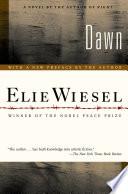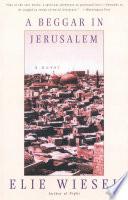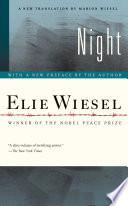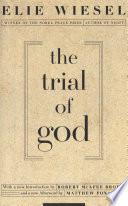Works

Dawn
Elie Wiesel
A Beggar in Jerusalem
Elie WieselFamous Elie Wiesel Quotes
“Because I remember, I despair. Because I remember, I have the duty to reject despair.”
Hope, Despair, and Memory (1986)
Context: Because I remember, I despair. Because I remember, I have the duty to reject despair. I remember the killers, I remember the victims, even as I struggle to invent a thousand and one reasons to hope.
Source: Night (1960)
Context: "Don't be deluded. Hitler has made it clear that he will annihilate all Jews before the clock strikes twelve."
I exploded:
"What do you care what he said? Would you want us to consider him a prophet?"
His cold eyes stared at me. At last, he said wearily:
"I have more faith in Hitler than in anyone else. He alone has kept his promises, all his promises, to the Jewish people."
Elie Wiesel Quotes about time
“To forget the dead would be akin to killing them a second time.”
Source: Night
Elie Wiesel Quotes about life
US News & World Report (27 October 1986)
Elie Wiesel: Trending quotes
Act I (p. 54)
The Trial of God (1979)
Elie Wiesel Quotes
“In Jewish history there are no coincidences.”
Interview in the BU Bridge (5 November 2004) http://www.bu.edu/bridge/archive/2004/11-05/wiesel.html
Variant: There are only encounters in history. There are no accidents.
As quoted in "10 Questions for Elie Wiesel" by Jeff Chu in TIME (22 January 2006) http://www.time.com/time/magazine/article/0,9171,1151803,00.html
Context: I believe mysticism is a very serious endeavor. One must be equipped for it. One doesn't study calculus before studying arithmetic. In my tradition, one must wait until one has learned a lot of Bible and Talmud and the Prophets to handle mysticism. This isn't instant coffee. There is no instant mysticism.
In a 1978 interview with John S. Friedman, published in The Paris Review 26 (Spring 1984); and in Elie Wiesel : Conversations (2002) edited by Robert Franciosi, p. 87
Context: Miracles in mysticism don't occupy such an important place. It's metaphor, for the peasants, for the crowds, to impress people. What does mysticism really mean? It means the way to attain knowledge. It's close to philosophy, except in philosophy you go horizontally while in mysticism you go vertically. You plunge into it. Philosophy is a slow process of logic and logical discourse: A bringing B bringing C and so forth. In mysticism you can jump from A to Z. But the ultimate objective is the same. It's knowledge. It's truth.
"Building a Moral Society", Chamberlin Lecture at Lewis & Clark College (1995)
Context: An immoral society betrays humanity because it betrays the basis for humanity, which is memory. An immoral society deals with memory as some politicians deal with politics. A moral society is committed to memory: I believe in memory. The Greek word alethia means Truth, Things that cannot be forgotten. I believe in those things that cannot be forgotten and because of that so much in my work deals with memory... What do all my books have in common? A commitment to memory.
“Miracles in mysticism don't occupy such an important place.”
In a 1978 interview with John S. Friedman, published in The Paris Review 26 (Spring 1984); and in Elie Wiesel : Conversations (2002) edited by Robert Franciosi, p. 87
Context: Miracles in mysticism don't occupy such an important place. It's metaphor, for the peasants, for the crowds, to impress people. What does mysticism really mean? It means the way to attain knowledge. It's close to philosophy, except in philosophy you go horizontally while in mysticism you go vertically. You plunge into it. Philosophy is a slow process of logic and logical discourse: A bringing B bringing C and so forth. In mysticism you can jump from A to Z. But the ultimate objective is the same. It's knowledge. It's truth.
“For us, forgetting was never an option. Remembering is a noble and necessary act.”
Hope, Despair, and Memory (1986)
Context: For us, forgetting was never an option. Remembering is a noble and necessary act. The call of memory, the call to memory, reaches us from the very dawn of history. No commandment figures so frequently, so insistently, in the Bible. It is incumbent upon us to remember the good we have received, and the evil we have suffered.
“It's up to you now, and we shall help you — that my past does not become your future.”
Speech at the UN World Peace Day (21 September 2006) New York, Speech in UN Webcast (00:16:35) http://webcast.un.org/ramgen/specialevents/se050921.rm
“An immoral society betrays humanity because it betrays the basis for humanity, which is memory.”
"Building a Moral Society", Chamberlin Lecture at Lewis & Clark College (1995)
Context: An immoral society betrays humanity because it betrays the basis for humanity, which is memory. An immoral society deals with memory as some politicians deal with politics. A moral society is committed to memory: I believe in memory. The Greek word alethia means Truth, Things that cannot be forgotten. I believe in those things that cannot be forgotten and because of that so much in my work deals with memory... What do all my books have in common? A commitment to memory.
“You must intervene. You must interfere. And that is actually the motto of human rights.”
Commencement ceremony http://piermarton.info/elie-wiesel-do-not-stand-idly-by-if-you-witness-injustice/ (Class of 2011) at Washington University in St. Louis.
Context: The greatest commandment to me in the Bible is not the Ten Commandments. (First of all, it’s too difficult to observe; second, we all pretend to observe.) My commandment is ‘Thou shall not stand idly by.’ Which means, when you witness an injustice: Don’t stand idly by. When you hear of a person or a group being persecuted: Do not stand idly by. When there is something wrong with the community around you or far away: Do not stand idly by. You must intervene. You must interfere. And that is actually the motto of human rights.
Nobel acceptance speech (1986)
Context: As long as one dissident is in prison, our freedom will not be true. As long as one child is hungry, our lives will be filled with anguish and shame. What all these victims need above all is to know that they are not alone; that we are not forgetting them, that when their voices are stifled we shall lend them ours, that while their freedom depends on ours, the quality of our freedom depends on theirs.
“My commandment is ‘Thou shall not stand idly by.’”
Commencement ceremony http://piermarton.info/elie-wiesel-do-not-stand-idly-by-if-you-witness-injustice/ (Class of 2011) at Washington University in St. Louis.
Context: The greatest commandment to me in the Bible is not the Ten Commandments. (First of all, it’s too difficult to observe; second, we all pretend to observe.) My commandment is ‘Thou shall not stand idly by.’ Which means, when you witness an injustice: Don’t stand idly by. When you hear of a person or a group being persecuted: Do not stand idly by. When there is something wrong with the community around you or far away: Do not stand idly by. You must intervene. You must interfere. And that is actually the motto of human rights.
Interview in O : The Oprah Magazine (November 2000)
"Have You Learned The Most Important Lesson Of All?" http://www.thehypertexts.com/Essays%20Articles%20Reviews%20Prose/Elie_Wiesel_Essay_Have_You_Learned_The_Most_Important_Lesson_Of_All.htm, published in Parade Magazine (24 May 1992)
Misattributed
Source: Robert McAfee Brown https://en.wikipedia.org/wiki/Robert_McAfee_Brown. Preface for the 25th anniversary edition of Night https://en.wikipedia.org/wiki/Night_%28book%29. Page v, Bantam Books paperback; 1982 reissue edition.
“There are victories of the soul and spirit. Sometimes, even if you lose, you win.”
Attributed in The Little Book of Romanian Wisdom (2011) edited by Diana Doroftei and Matthew Cross
Source: Night
“Indifference, to me, is the epitome of evil.”
US News & World Report (27 October 1986)


